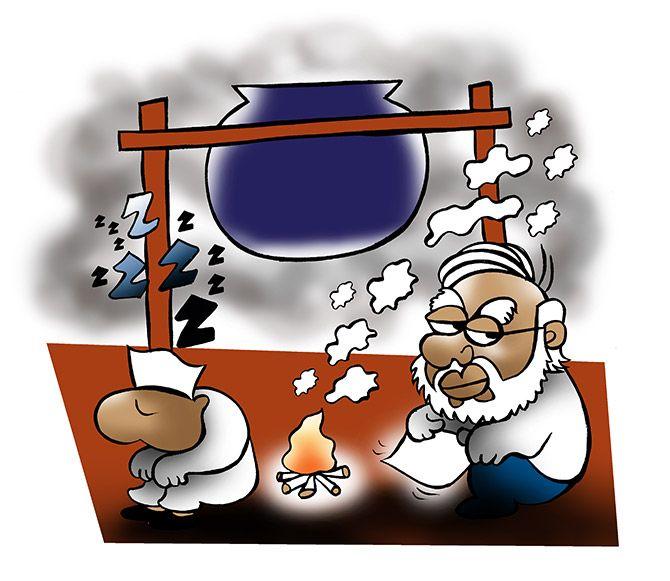Growth in the third quarter (October-December) is expected to be the weakest in years, with spending hit due to unavailability of enough replacement currency, reports Dilasha Seth/Business Standard
 The gross domestic product (GDP) growth accelerated slightly in the July-September quarter, compared to the growth recorded in the previous quarter, but economists and policy planners said growth will suffer a setback in the second half of the year because of the impact of demonetisation.
The gross domestic product (GDP) growth accelerated slightly in the July-September quarter, compared to the growth recorded in the previous quarter, but economists and policy planners said growth will suffer a setback in the second half of the year because of the impact of demonetisation.
This also puts pressure on the government's monetary policy committee (MPC) to cut the policy rate at the review meeting next week, amid the post-demonetisation weakening of demand and investment activity.
GDP rose 7.3% in the quarter ended September, higher than the 7.1% in the previous one, as consumption improved but investment slumped, data from the Central Statistics Office showed on Wednesday.
With core economic activity almost at a halt after the demonetisation of high denomination currency since November 8, the first half's slowing is expected to increase in the rest of the financial year, putting at risk the government's earlier forecast of 7% to 7.75% for 2016-2017.
"Both GDP and GVA (gross value added) growth decelerated in Q2 (September quarter), relative to Q2 of FY16. The initial data for Q2 imparts a further downside to our GDP and GVA growth forecasts of 7.5% and 7.3% for FY17, which we had revised downward after demonetisation," said Aditi Nayar, principal economist at rating agency Icra.
Growth in the third quarter (October-December) is expected to be the weakest in years, with spending hit due to unavailability of enough replacement currency.
Demonetisation could also affect advance estimates for 2016-2017, on which Budget assumptions would be made.
Chief Statistician T C A Anant said the advance estimates will only take data available till December 2016.
The MPC, chaired by Reserve Bank of India Governor Urjit Patel, is expected to meet on December 6-7.
"Amidst the ongoing demonetisation and its anticipated impact on growth, (there's) a strong case for frontloading of a rate cut of 25 basis points (bps), followed by another 25 bps cut in February," said Shubhada Rao, chief economist, YES Bank.
Growth essentially came from government spending and higher agriculture expansion of 3.3%, the highest in any quarter during the Narendra Modi government tenure so far, on account of a normal monsoon.
Public administration, defence and other services -- largely government spending -- rose 12.5% in the quarter, a pace that will have to be sustained over the rest of the financial year to ensure steady economic growth.
Besides, discrepancies accounted for one-fifth of GDP growth in the second quarter.
These were high in the first quarter as well, but contributed to 13% of GDP growth then.
Growth in GVA -- aggregate of agriculture, industry and services -- declined to 7.1% in Q2, against 7.3% in Q1.
This shows that GDP growth in Q2 was also contributed to by a sharp contraction in subsidies provided by the government, compared to those given in the first quarter.
Manufacturing, a focus area of the government, slowed in Q2 to 7.1%, as against 9.1% in the previous quarter.
Industrial activity is expected to be subdued in the next quarter, due to the cash crunch.
Industry as a whole (including mining, manufacturing and electricity) grew by 5.1%, from 6% in the same period last year.
As for investment activity, gross fixed capital formation fell by 5.6%, from a decline of 3.1% in the previous quarter.
Lending rates are expected to be cut over the next few weeks, as banks are flush with deposits after the old currency ban. They have seen deposits of Rs 8 lakh crore since November 8.
Consumption was the bright spot in the data. Private final consumption expenditure grew 7.5%, as against 6.7% in the previous quarter.
The higher salaries on account of the Pay Commission implementation from September and an early festival season might have boosted demand during the quarter-end.
"The demonetisation move will act as a temporary setback to growth in the coming quarter, but we expect a rebound in investment, as the government is taking decisive measures to bring transparency in the system and is committed to improve the investment cycle, which would ultimately take the economy to (annual) double-digit growth trajectory in the long run," said Chandrajit Banerjee, director general, Confederation of Indian Industry.












 © 2025
© 2025